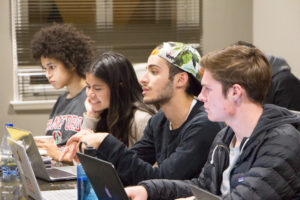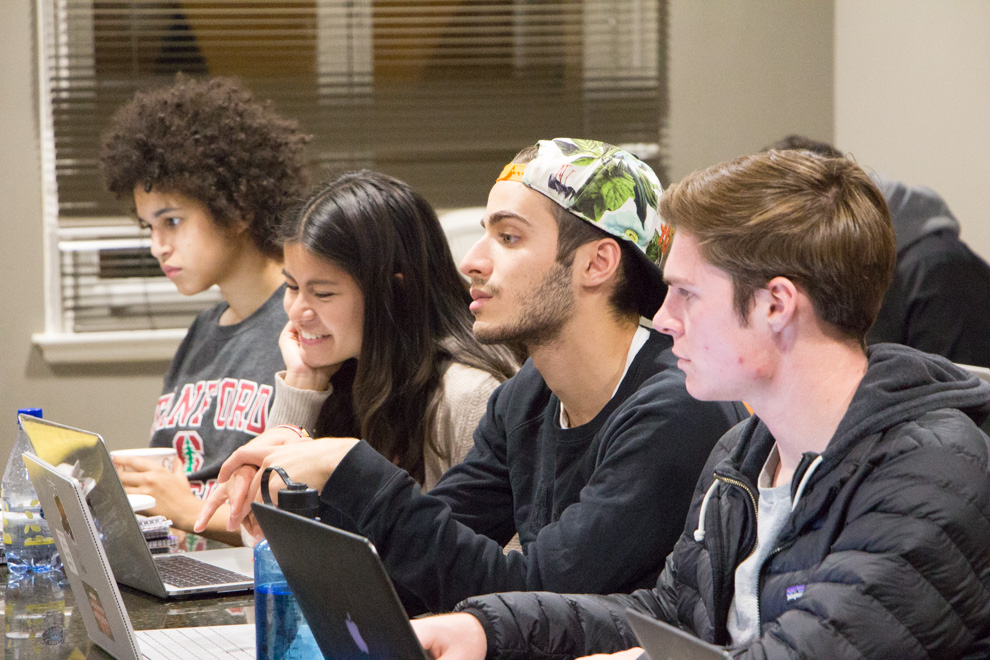On Tuesday night, the Undergraduate Senate condemned Stanford College Republicans (SCR) for hosting Robert Spencer at an ASSU-financed event but did not revoke its funding.

Spencer, who co-founded Stop Islamization of America and the American Freedom Defense Initiative, will be speaking at Stanford on Nov. 14 by invitation from SCR. Some students have opposed Spencer’s visit due to his Islamophobic views – an online petition to defund the event has been circulating via email, while an unknown individual tore down posters and flyers advertising the event in a campus dormitory over the weekend.
In its official statement on the Robert Spencer event, the Senate stated that they “have an obligation to consider all student groups for funding equally, regardless of their respective ideologies.”
The Senate cited to its Mission Statement, which states that the Senate is responsible for appropriating funding to over five hundred voluntary student organizations that in turn provide the majority of programming for the entire campus. It also said that it must act in compliance with Supreme Court decisions, federal law and California statutes regarding the protection of free speech on college campuses when making decisions – including stipulations that prevent the preemptive censoring of speech.
Caleb Smith ’17 M.A. ’18, a Daily news staffer who authored the petition against the event, urged the Senate to reconsider its decision to continue to fund the event.
“The ASSU is a private members association and is not a governmental organization, so it doesn’t have the same requirements that would be attached to a local government,” said Smith. “There is a difference between actively preventing speech from happening and providing the equal amount of discretionary funding to all speakers of all viewpoints, no matter how extreme.”
Smith added that the Senate “already exercises considerable discretionary authority over how its funds are spent” on a day-to-day basis.
Senate Chair Kojoh Atta ’20 thanked Smith for his concern but responded that the Senate could not amend their statement. The Senate emphasized that it is responsible for the funding – not planning – of events and that the nature of the events are curated by the student groups that hold them. Additionally, the ultimate decision to allow or disallow events on university property belongs to Stanford administrators.
“We can’t freeze the funding,” said Senator Doris Rodriguez ’20, “but [students] have the right to request a refund on student fees to the ASSU if you feel like your voice is being ignored. But that has implications, because that would be taking funds from other student groups.”
“If you were to take back your student funds, you unfortunately would not be able to take back the funds that went to Robert Spencer,” Student Life committee chair Lizzie Ford ’20 added.
Despite its decision to continue funding the event, the Senate, in its joint resolution with the Graduate Student Council, officially condemned the SCR’s decision to invite Spencer.
In the resolution, which will be voted on later next week, Senators wrote that they “believe in free in speech and the open exchange of ideas at Stanford, but that this can only be possible within a culture of mutual respect. Bringing in a speaker that has founded an organization that has been designated as a hate group is antithetical to the inclusive and diverse culture that Stanford aspires to foster.”
Senate reaffirmed that it will continue to support all student groups equally, and that all Muslim students are valued members of the Stanford community.
Advocacy committee chair Hamzeh Daoud ’20 made a final comment on the Robert Spencer event, voicing his own experience as a Muslim.
“My religion is a religion of peace and love,” said Daoud. “This person [Robert Spencer] in no way reflects anything about my religion when talking about extremists. I have been stopped at airports because of my religion. I have been questioned about my position at Stanford because of my religion.”
Daoud concluded by reaffirming his pride in his Muslim identity and community.
“I’m here to say that I’m Muslim and I’m proud, and nothing can change that,” Daoud added. “Muslims aren’t passive forces – we’re active, and we have the power to change and react. However, we don’t need people who suffer from the white savior complex to talk over us. Be there to help, and be there to recommend. If you speak over us, don’t. Leave. I’m Muslim and I will say what I have to say and I will do what I have to do. I won’t be a passive force.”
Contact Felicia Hou at fhou‘at’ stanford.edu.
This piece has been updated to remove potentially identifying information about a student who felt threatened after some of his personal information was spread elsewhere online.
